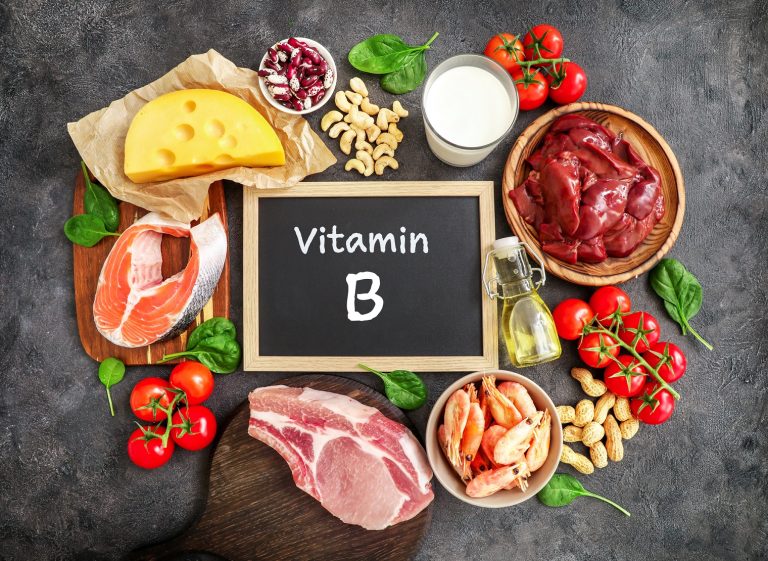Vitamin B5 – better known as pantothenic acid – is involved in many processes in the body. Utopia explains how you can cover your daily needs and what happens in the event of a shortage.
Pantothenic acid is part of the vitamin B complex and, like all B vitamins, is water-soluble. Our body can absorb the vitamin as pantothenic acid directly from food or produce it ourselves from dexpanthenol, a provitamin. Many creams and tinctures contain dexpanthenol as an active ingredient, which can promote wound healing but do not contribute to the supply of the vitamin.
The functions of pantothenic acid

In order to convert food into usable energy, the body needs the help of the vitamins of the vitamin B complex. Pantothenic acid plays an important role in this: it is involved in the production of coenzyme A. Coenzyme A, in turn, is contained in all living cells as a component of enzymes and is involved in a large number of processes. Not without reason is the meaning of the Greek word “pantothen”: everywhere.
In this way, vitamin B5 contributes to the processing of carbohydrates, proteins and fats. In addition to converting the food consumed into usable energy, pantothenic acid plays an important role in the formation of important substances such as amino acids, the blood pigment heme, cholesterol, provitamin D and bile acids.
Pantothenic acid is often referred to as “brain food” because, in addition to its role in energy metabolism, it is also involved in the formation of the neurotransmitter acetylcholine. Contrary to what many supplements promise, however, vitamin B5 does not provide “nerves of steel” or “anxiety reduction.” There are only four statements – so-called health claims – that are scientifically proven and legally approved:
Pantothenic acid contributes to normal energy metabolism.
Pantothenic acid contributes to normal synthesis and metabolism of steroid hormones, vitamin D and some neurotransmitters.
Pantothenic acid helps reduce tiredness and fatigue.
Pantothenic acid contributes to normal mental performance.
What happens with vitamin B5 deficiency?
A sole deficiency of pantothenic acid is rare, usually the body also lacks other B vitamins at the same time. If there is a vitamin B5 deficiency, the following symptoms may occur:
easy fatigue
sleep disorders
headache
swaying gait
anemia
immunodeficiency
stomach pain
muscle weakness
If the body is undersupplied with vitamin B5 for months, a very figuratively named disease can occur: “Burning Feet Syndrome” (burning feet syndrome), which was first described in prisoners of war in World War II. Not only the soles of the feet, but also the palms of the hands are noticeable as burning or stinging. In general, however, a deficiency only occurs in the case of extreme malnutrition or alcoholism.
Overdose side effects
There is no excessive intake of vitamin B5 / pantothenic acid through normal nutrition. Digestive problems such as diarrhea are only possible due to the wrong dosage of food supplements.
Because apart from that no adverse health effects of an overdose of vitamin B5 are known, the Federal Institute for Risk Assessment (BfR) has not set a maximum level for pantothenic acid. At the same time, this does not mean that a lot also helps a lot: Instead of relying on advertising promises, you should – as with all dietary supplements – have the intake checked by a doctor.
Daily requirement of vitamin B5
The amount of 6 mg per day recommended by the German Society for Nutrition (DGE) for adults is covered with a balanced diet. Those who suffer from chronic inflammation or alcoholism, however, have a slightly higher need.
Which foods contain the vitamin?

Like most of the vitamins in the vitamin B complex, pantothenic acid is also found in particularly high concentrations in the liver and other offal. Other animal foods such as fish, meat, dairy products and eggs also help to meet the need for vitamin B5 / pantothenic acid.
Since pantothenic acid is found in almost all foods, supply is generally considered unproblematic. Vegetarians and vegans can cover their needs with legumes and mushrooms or – regardless of the seasonal calendar – with crunchy nuts and whole grain products. Wheat bran contains a particularly large amount of vitamin B5 / pantothenic acid, which can easily be added to mueslis, smoothies or pastries.
With a large plate of pea stew (300g) it is possible to cover the daily requirement of vitamin B5 with just one meal.

